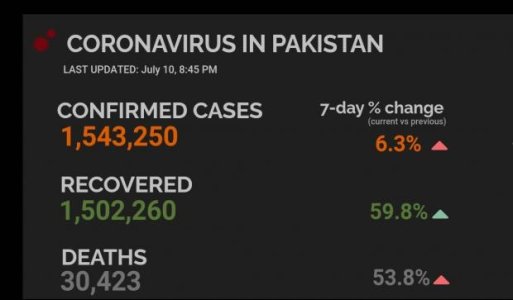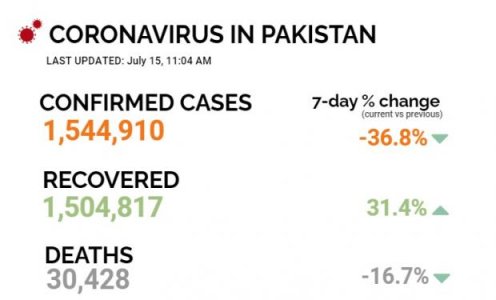daytrader
ODI Debutant
- Joined
- Jul 11, 2015
- Runs
- 10,861
- Post of the Week
- 1
NCOC advises caution as weather, Covid complicate holiday season
ISLAMABAD: With tourism expected to peak during the Eidul Azha holidays, the National Command and Operation Centre (NCOC) has advised travelers to exercise caution, check weather forecasts and pre-book their accommodations.
An advisory issued on Wednesday stated that the Covid-19 cases were rising once again and therefore, tourists should strictly adhere to the SOPs.
In the last 24 hours, as many as 805 more Covid-19 cases have been reported, taking the national positivity to 4.69 pc, while the number of patients on critical care has increased to 169.
Tourists have been advised to wear masks, use hand sanitisers and avoid going to crowded places and maintain social distancing.
“It should be made sure that all tourists [are] vaccinated and those who have been vaccinated, should go for the booster dose,” the advisory stated.
The tourists should check weather prediction and confirm hotel bookings before traveling.
“As hotels and restaurants ... remain jam-packed during Eid holidays, make sure that your residence is already booked and you have edible items [to] use in case of prolonged stay,” it stated.
National Institute of Health (NIH) Executive Director Maj Gen Aamer Ikram has also urged tourists to collect route and weather information before embarking on the journey.
In a statement, Minister of Health Abdul Qadir Patel also urged the masses to strictly adhere to the SOPs.
US donates mobile laboratories
In a separate development, the US government has donated four mobile laboratories to Pakistan to strengthen the capacity for Covid-19 testing and other communicable diseases.
The laboratories donated through the US Agency for International Development (USAID) will improve the accuracy of diagnoses, reduce testing turnaround time, and protect healthcare workers.
The state-of-the-art laboratories were handed over to the NIH and Ministry of Health on Wednesday in a ceremony in Islamabad.
The ceremony was attended by the US Ambassador Donald Blome and Federal Health Minister Abdul Qadir Patel, along with the ministry officials.
Addressing the ceremony, Mr Blome commended the healthcare workers and officials for their effective response to the pandemic.
He also highlighted Pakistan’s successful vaccination campaign to swiftly inoculate the citizens.
“These mobile laboratories will strengthen the diagnostic capacity of the provincial health departments and enable the government to respond quickly and effectively in hard-to-reach remote areas during emergencies, or an outbreak and epidemic,” Mr Blome said.
Mr Patel expressed gratitude for the US support to improve healthcare services in Pakistan and called it “a reflection of the strong bilateral relations between the two countries.”
According to a statement, since the beginning of the pandemic, the USAID has worked to save lives and contain the outbreak in more than 120 countries, including Pakistan.
USAID’s ongoing assistance provides emergency relief, strengthens health systems, supports vaccine readiness and distribution, improves public health education, and protects health care workers and facilities, the statement added.
The United States has provided nearly 61.6 million doses of vaccines, one million Covid-19 rapid diagnostic test kits, and critical health supplies and training to healthcare workers in Pakistan.
These efforts are a part of nearly $70 million in direct support and $9.2 million in-kind support that the US government extended to Pakistan.
Dawn
ISLAMABAD: With tourism expected to peak during the Eidul Azha holidays, the National Command and Operation Centre (NCOC) has advised travelers to exercise caution, check weather forecasts and pre-book their accommodations.
An advisory issued on Wednesday stated that the Covid-19 cases were rising once again and therefore, tourists should strictly adhere to the SOPs.
In the last 24 hours, as many as 805 more Covid-19 cases have been reported, taking the national positivity to 4.69 pc, while the number of patients on critical care has increased to 169.
Tourists have been advised to wear masks, use hand sanitisers and avoid going to crowded places and maintain social distancing.
“It should be made sure that all tourists [are] vaccinated and those who have been vaccinated, should go for the booster dose,” the advisory stated.
The tourists should check weather prediction and confirm hotel bookings before traveling.
“As hotels and restaurants ... remain jam-packed during Eid holidays, make sure that your residence is already booked and you have edible items [to] use in case of prolonged stay,” it stated.
National Institute of Health (NIH) Executive Director Maj Gen Aamer Ikram has also urged tourists to collect route and weather information before embarking on the journey.
In a statement, Minister of Health Abdul Qadir Patel also urged the masses to strictly adhere to the SOPs.
US donates mobile laboratories
In a separate development, the US government has donated four mobile laboratories to Pakistan to strengthen the capacity for Covid-19 testing and other communicable diseases.
The laboratories donated through the US Agency for International Development (USAID) will improve the accuracy of diagnoses, reduce testing turnaround time, and protect healthcare workers.
The state-of-the-art laboratories were handed over to the NIH and Ministry of Health on Wednesday in a ceremony in Islamabad.
The ceremony was attended by the US Ambassador Donald Blome and Federal Health Minister Abdul Qadir Patel, along with the ministry officials.
Addressing the ceremony, Mr Blome commended the healthcare workers and officials for their effective response to the pandemic.
He also highlighted Pakistan’s successful vaccination campaign to swiftly inoculate the citizens.
“These mobile laboratories will strengthen the diagnostic capacity of the provincial health departments and enable the government to respond quickly and effectively in hard-to-reach remote areas during emergencies, or an outbreak and epidemic,” Mr Blome said.
Mr Patel expressed gratitude for the US support to improve healthcare services in Pakistan and called it “a reflection of the strong bilateral relations between the two countries.”
According to a statement, since the beginning of the pandemic, the USAID has worked to save lives and contain the outbreak in more than 120 countries, including Pakistan.
USAID’s ongoing assistance provides emergency relief, strengthens health systems, supports vaccine readiness and distribution, improves public health education, and protects health care workers and facilities, the statement added.
The United States has provided nearly 61.6 million doses of vaccines, one million Covid-19 rapid diagnostic test kits, and critical health supplies and training to healthcare workers in Pakistan.
These efforts are a part of nearly $70 million in direct support and $9.2 million in-kind support that the US government extended to Pakistan.
Dawn













